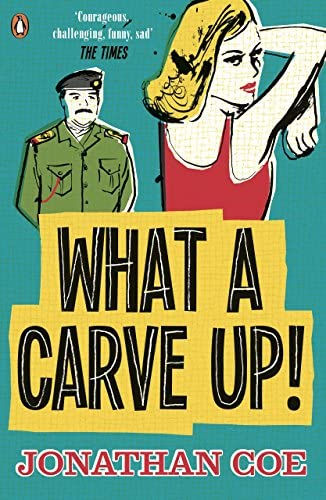
Jonathan Coe has long been one of the most interesting authors of modern Britain. He masterfully does what few people succeed in - lovingly planting ideas and feelings in the soil of an amazingly fertile plot.
"If Charles Dickens and Agatha Christie had ever managed to collaborate, they might have produced this shamelessly entertaining novel, which introduces readers to what may be the most powerful family in England--and is certainly the vilest. A tour de force of menace, malicious comedy, and torrential social bile, this book marks the American debut of an extraordinary writer."
No president can easily send his sons and daughters to war. My attention began to dissipate and returned to focus on Fiona only when she said: "I am not switching off." She nodded at my hand. By that time I had returned to the chair opposite and, without realizing it, took the video console. And now he was directed at her, and my finger froze on the pause button.
Jonathan Coe's literary summer, no special plans, his books followed one after the other after "Middle England". This happens when you meet someone with whom it is fun and interesting, not having the strength to take it like this - and part. There is a special, slightly detached cool comfort, they do not flirt with you, they do not try to win trust with sincere sensitivity, amaze the imagination with heroism and beauty of their actions, stun with unthinkable passions - everything is meditatively under siphon.
On mature reflection, there are much more inconceivable plot twists, emotional outbursts, bright deeds than are noticeable at first glance. But Coe has this ballet ability to perform incredibly difficult pirouettes with apparent ease, as if they were not worth any effort. Ascend to philosophical heights and descend into the depths of psychological research, like on an escalator in a subway. Although the main thing for me in him is not even this, but the social component.
Raise a voice in defense of the little ones of this world, who cannot speak for themselves, and pursue a line to assess any form of segregation as evil. Express the views not even of socialism, but of intersecfeminism, following a more cosmic ethics. Nobody does this with such consistent adherence to principles, but "What a swindle" is the quintessence. It is a pity that the book written a quarter of a century ago is perceived as acutely relevant today - it turns out that the world has not moved much over the past years towards a correct and just structure. But, you know, it has moved, and the merit of this book with her is that they saturate the collective unconscious with the right energy.
Young, still promising, but with a career that is noticeably stalled after the second novel, the writer Michael receives an offer that is difficult to refuse - to act as a biographer of the Winshaw family.They are such super-oligarchs: rich, well-born, powerful, interests are represented in various spheres of modern society. There is no need to paint a ceremonial portrait, the employer gives carte blanche.
Tabitha Winshaw, declared insane by her relatives, spends her life in a comfortable clinic, and, having considerable independent means (the family is mega-rich, don't you forget?), Can afford the whim of paying for the labor of someone who eventually mixes a kindred serpentarium with dirt. Although I, in Michael's place, would not be in a hurry to finish very soon, the payment system is there: "the soldier is asleep, the service is in progress." He is in no hurry.
Although more and more circumstances that are revealed in the course of research make us think of a noble family as a bunch of monsters, and Claes's ashes are beating more and more persistently in the chest of the unfortunate writer. In each of the areas where this Cabinet of Curiosities was noted: politics, media, business, health care, agriculture - it consistently pursues a course to destroy the nation (and not only the human part) In an old joke that in the States they will turn a blind eye to the street crossing in the wrong place, if a person carries a child in his arms, in England, if he walks with an animal, in Russia - if with a bottle, in this joke there is only a fraction of a joke. The British treat animals with special trepidation. And I, reading part of Dorothy, was glad that I didn’t eat meat.
Of course, with a noble family, this is a metaphor. As with the intelligentsia, which goes to the service of the ruling class in order to expose, and in the end ends up serving its interests. But Fiona's theme is filled with such bitter, desperate, hopeless tenderness, and the final Agathakristian whirlwind is so absurdly nightmare that it is impossible not to fall in love. Although the most mine is there, Michael's attempts to write a love scene.
You can order «What a Carve Up!» at BlackWell's
This article was sponsored by Rita Vilner.
Bình luận